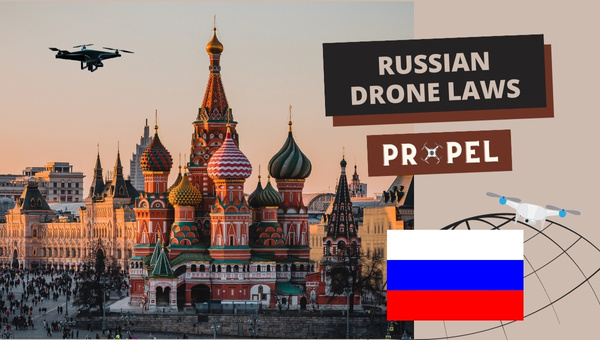Along with many countries around the world, Russia has passed several drone laws aimed at providing a regulatory framework to support their use. An article published on the professional drones blog platform Propel RC, and reported by UAS Vision, examines the current legislation and how it applies to drone operations.
“Drones are currently legal to use in Russia,” says Propel RC. “However, it’s important to note that restrictions and regulations govern their use. For example, all drones must be registered with the Federal Air Transport Agency before they can be used in public spaces. Additionally, commercial drone pilots must pass a special licensing exam and obtain permission from local authorities before they can begin operations.
“As unmanned aerial systems, or drones, become more prevalent, so too do the questions about how they should be used. While these rules are by no means exhaustive, they should give you a good starting point for understanding what is and isn’t allowed when flying your drone. While flying a drone is legal in Russia, most Russian cities have GPS jammers installed, which emit radio frequencies that interfere with electronic devices like drones, rendering them useless.
“In June 2015, the Russian Federation’s state legislature amended the country’s air code, resulting in all unmanned aerial vehicles being reclassified as aircraft. Consequently, they are now subject to the civil aviation authority’s jurisdiction.
- All drones that weigh more than 250 grams must be registered with the Federal Air Transport Agency.
- Keep your drone grounded in areas with high population densities or where flying is prohibited.
- Always take other people’s privacy into consideration before flying your drone.
- You should only fly your drone during the daytime.
- Try to avoid flying when the weather is expected to be bad.
- Keep at least a 5-mile distance from any airports, heliports, or aerodromes.
- Keep in mind that some large cities have GPS jammers that can disrupt your drone’s positioning. So it is advised to fly your drone at a safe distance from them.
- Unless you have explicit written permission, do not fly within 500 meters of any military installation, airport, or densely populated area.
- You must first obtain a permit if you wish to fly over a national park or reserve.
- It is advised that you avoid flying above sporting events.
- To fly a drone weighing more than 4.4 pounds or at night, you must get a waiver first.
Recreational drones
“If your drone weighs less than 250 grams and you stay clear of restricted or forbidden zones, you can fly without a permit or license in Russia.
- You don’t need a license to operate a drone that weighs 30 kilograms or less.
- If you choose to fly your drone in populated areas, be respectful of people’s space and privacy.
- You should only fly when the weather is good and you can see where you’re going.
- You should get insurance that covers all risks.
- Depart from all airports and heliports, giving priority to other aircraft categories. If you spot another plane while flying, make a quick landing.
- Though Russian law states that drones over 250 grams must be registered, it appears as though the authorities have not put this system into effect yet.
“Keeping these rules and regulations in mind, you can fly your drone safely and responsibly in Russia.
Federal Air Transport Agency
“The Federal Air Transport Agency is the federal executive body in Russia that is responsible for regulating drones. There are currently no specific regulations in place for drones, but the agency is working on developing them. In the meantime, it is recommended that drone operators follow the same rules and regulations as traditional aircraft. This includes maintaining a safe distance from other aircraft, not flying over populated areas, and not flying in adverse weather conditions.
“The agency is also working on creating a drone registration system, which will help improve safety and accountability. Ultimately, the goal is to ensure that drones are operated safely and responsibly in order to protect both pilots and the general public.
Conclusion
“Though drones are still a relatively new technology, the Federal Air Transport Agency is working on creating regulations to ensure that they are operated safely and responsibly in Russia. It is important for drone operators to follow existing laws and guidelines to ensure their safety as well as the safety of others. As regulations become more established, pilots will have an easier time navigating what is and isn’t allowed and understanding the potential risks of flying,” concludes the article written by Richard J Gross.
(Image: New drone laws in Russia: Propel RC)
For more information visit:




